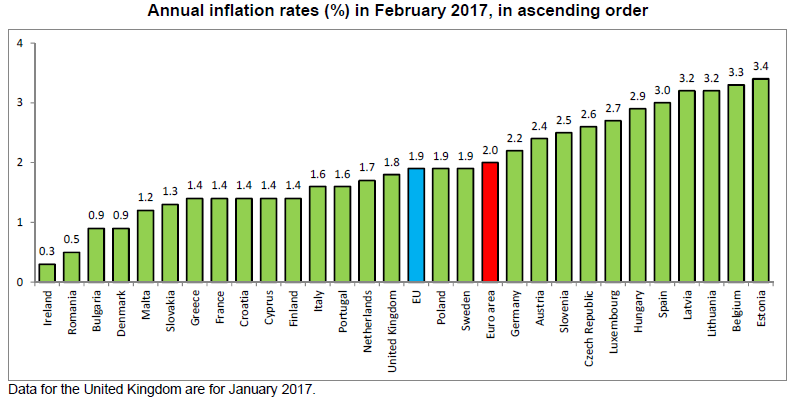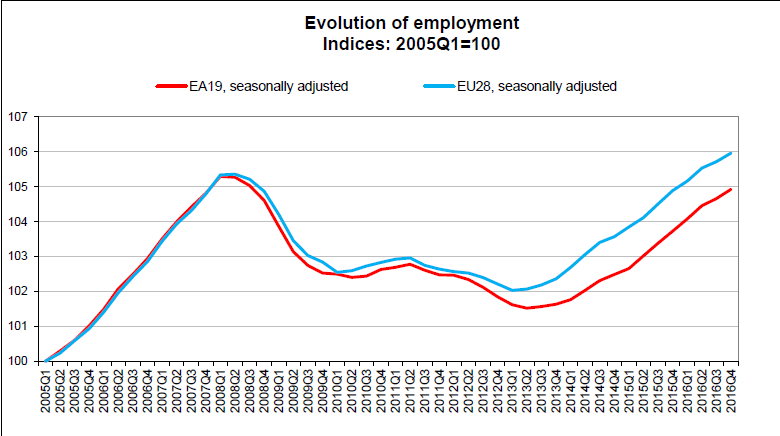Gros, Daniel, (2017), “Mixed Signals from the Eurozone”, Project Syndicate, 16 March What does the eurozone’s future hold? It depends where you look. Some economic indicators suggest that things are looking up for the common currency’s survival; for example, employment has returned to its pre-crisis peak, and per capita GDP growth exceeded that of the United States last year. At the same time, political risks seem to be increasing, despite the …Read More
What future for Europe?
Wolff, Guntram B., (2017), “What future for Europe?”, Bruegel, 16 March The Commission’s White Paper on the future of the EU sets out five scenarios, but misses the fundamental questions facing Europe. How should the EU interact with its neighbourhood? How can we manage the tensions created by multi-speed integration? And above all how can the Euro be made sustainable in the absence of a major step towards fiscal union? …Read More
The Role of Fiscal Policy When Private Debt is High
Batini, Nicoletta, Melina, Giovanni, Moreno Badia, Marialuz, Villa, Stefania, (2017), “The Role of Fiscal Policy When Private Debt is High”, EconoMonitor, 15 March Excessive private debt is a major headwind against the global recovery. Where fiscal space is available, a more active role of fiscal policies can facilitate an orderly private deleveraging while minimizing its output costs. However, fiscal policy cannot do it alone; it has to be supported by complementary …Read More
Annual inflation up to 2.0% in the euro area
Eurostat/Annual inflation up to 2.0% in the euro area, 16 March 2017 Euro area annual inflation was 2.0% in February 2017, up from 1.8% in January. In February 2016 the rate was -0.2%. European Union annual inflation was 1.9% in February 2017, up from 1.7% in January. A year earlier the rate was -0.1%. These figures come from Eurostat, the statistical office of the European Union. Relevant Posts Eurostat/ “Euro area annual …Read More
Sovereign spreads in the Eurozone on the rise: Redenomination risk versus political risk
De Santis, Roberto, (2017), “Sovereign spreads in the Eurozone on the rise: Redenomination risk versus political risk”, VoxEu, 16 March French sovereign spreads have risen in recent months, coinciding with debate over the euro ahead of the country’s presidential elections in May. Italian sovereign spreads have been rising since the beginning of 2016. This column argues that investors are not pricing a break-up of France from the Eurozone. Most likely, they …Read More
Employment up by 0.3% in the euro area and by 0.2% in the EU28
Eurostat/Employment up by 0.3% in the euro area and by 0.2% in the EU28, 15 March The number of persons employed increased by 0.3% in the euro area (EA19) and by 0.2% in the EU28 in the fourth quarter of 2016 compared with the previous quarter, according to national accounts estimates published by Eurostat, the statistical office of the European Union. In the third quarter of 2016, employment increased by 0.2% …Read More
Industrial production up by 0.9% in euro area Up by 0.5% in EU28
Eurostat/Industrial production up by 0.9% in euro area Up by 0.5% in EU28, 14 March In January 2017 compared with December 2016, seasonally adjusted industrial production rose by 0.9% in the euro area (EA19) and by 0.5% in the EU28, according to estimates from Eurostat, the statistical office of the European Union. In December 2016 industrial production fell by 1.2% in the euro area and by 0.7% in the EU28. Relevant …Read More
Workers in 7 EU countries worse off today than 8 years ago
European Trade Union Institute and European Trade Union Confederation, (2017), “Workers in 7 EU countries worse off today than 8 years ago”, 13 March Workers are still not feeling economic recovery: wages are lower now than they were eight years ago in seven EU member states, according to new research published today by the European Trade Union Institute (ETUI) and European Trade Union Confederation (ETUC). The research also shows that in 18 …Read More
How Much Europe Can Europe Tolerate?
Rodrik, Dani, (2017), “How Much Europe Can Europe Tolerate?”, Project Syndicate, 14 March This month the European Union will celebrate the 60th anniversary of its founding treaty, the Treaty of Rome, which established the European Economic Community. There certainly is much to celebrate. After centuries of war, upheaval, and mass killings, Europe is peaceful and democratic. The EU has brought 11 former Soviet-bloc countries into its fold, successfully guiding their post-communist …Read More
Spain: Maintain reform momentum to enhance economic recovery and boost inclusive growth
OECD, (2017), “Spain: Maintain reform momentum to enhance economic recovery and boost inclusive growth”, 14 March The Spanish economy is enjoying a robust recovery from a deep recession, with structural reforms contributing to high growth rates and a gradual decline in unemployment. However, further measures to promote innovative business investment and improve skills are needed to both boost productivity and ensure that the benefits of growth reach all Spaniards, according to …Read More






